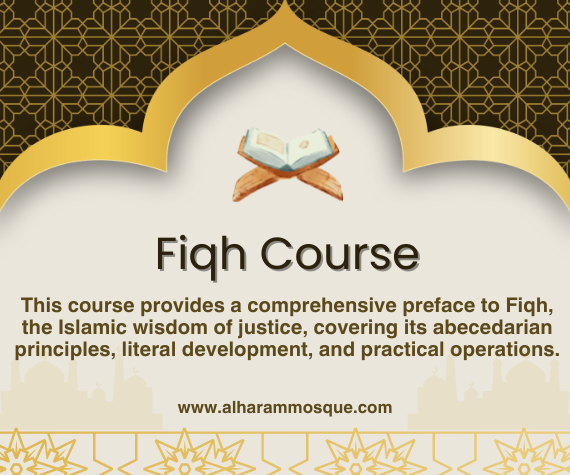Service Details

Fiqh Course
Fiqh Course This course provides a comprehensive preface to Fiqh, The Islamic Learning objects Trace the literal development of Fiqh from the time of the Prophet Muhammad( PBUH) to the present. Identify and explain the primary sources of Islamic law theQur’an and Sunnah. Fete the secondary sources of Islamic law Ijma( agreement), Qiyas( analogical logic), and other attachment sources. dissect the methodologies employed by the classical seminaries of study( Madhahib) in Fiqh. Apply principles of Fiqh to contemporary issues and case studies. Course figure Week 1 preface to Fiqh Description and compass of […]Fiqh Course
This course provides a comprehensive preface to Fiqh, The Islamic
Learning objects
- Trace the literal development of Fiqh from the time of the Prophet Muhammad( PBUH) to the present.
- Identify and explain the primary sources of Islamic law theQur’an and Sunnah.
- Fete the secondary sources of Islamic law Ijma( agreement), Qiyas( analogical logic), and other attachment sources.
- dissect the methodologies employed by the classical seminaries of study( Madhahib) in Fiqh.
- Apply principles of Fiqh to contemporary issues and case studies.
Course figure
Week 1 preface to Fiqh
- Description and compass of Fiqh
- Importance of Fiqh in the life of a Muslim
- Relationship between Fiqh and other Islamic lores
Week 2 literal Development of Fiqh
- Fiqh during the time of the Prophet Muhammad( PBUH)
- The period of the correctly Guided Caliphs
- The conformation and connection of the classical seminaries of study( Hanafi, Maliki,Shafi’i, Hanbali)
Week 3 Primary Sources of Islamic Law
- TheQur’an structure, themes, and legislative verses
- The Sunnah types, compendium, and part in Islamic law
Week 4 Secondary Sources of Islamic Law
- Ijma( Consensus)
- Qiyas( Analogical logic)
- Other sources Istihsan( juristic preference), Istislah( public interest),’ Urf( custom),etc.
Week 5 Methodologies of the Classical seminaries of Thought
- Overview of the four main Sunni seminaries of study
- relative analysis of their methodologies
- preface to the Shia Jafari academy of study
Week 6 Fiqh and Contemporary Issues
- operation of Fiqh principles to ultramodern– day issues
- Case studies bioethics, finance, family law,etc.
- The part of Fiqh in a pluralistic society
Week 7 Tools of Ijtihad( Independent logic)
- Description and significance of Ijtihad
- Qualifications for a Mujtahid( one who performs Ijtihad)
- Contemporary approaches to Ijtihad
Week 8 Review and Final Assessment
- Recap of crucial generalities and principles
- Open discussion and Q&A
-

